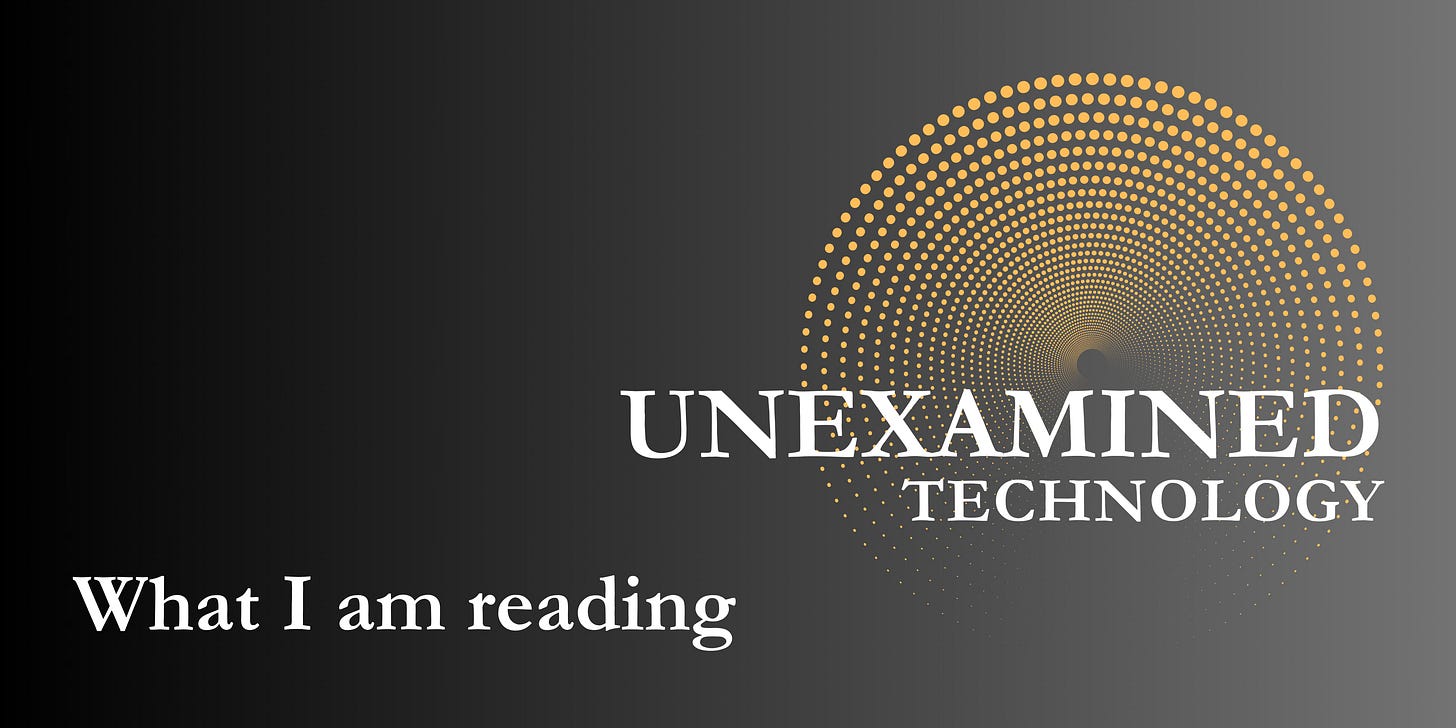Examined readings on technology (and more): the shortcomings of ambition
The Monday edition, March 18th, 2024
Welcome to my biweekly notes on books, articles, and Substacks. Understanding our relationship to technology takes much more than reading about technology - technology reflects our hopes and fears as humans. Therefore, I often find that the perspective we need to approach technology with comes from outside technological literature, from writings that say something meaningful about human nature.
Please check out Unexamined Technology page at bookshop.org - books that I write about are available there and purchasing them via the shop supports independent bookstores and my work also just a little bit.
Pick’s for Monday, 18th of February 2024
Examined book of the week
David Whyte: Consolations: The Solace, Nourishment and Underlying Meaning of Everyday Words
is one of my favourite poets. His essay collection Consolations is not a work of poetry, but a book full of equally insightful writings that dive into the more profound meanings of words. Whyte’s writing here is similar to poetry, though - each beautiful sentence packs so much meaning and contemplation that one cannot read the essays without concentration, and they benefit from multiple reads.Here’s how he writes about giving:
Giving is not done easily; giving is difficult. Giving well is, in fact, a discipline that must be practised and observed over years to be done properly. The apprenticeship to the art often involves giving the wrong thing to the wrong person at the wrong time, and learning how to do the opposite through time and trial; it means getting beyond the boundaries of our own needs; it means understanding another and another’s life. Most importantly, it acknowledges implicitly that we ourselves must be recipients of things we cannot often identify or even find ourselves. - ‘Giving’ in Consolations
The book has over 60 essays dense with insight. I want to briefly focus on ambition, something that I believe drives people working in innovation and technology. Whyte writes:
We are all compost for worlds we cannot yet imagine. Ambition takes us toward that horizon, but not over it. - ‘Ambition’ in Consolations
I used to call myself an ambitious person and was proud of it. Ambition gave me a drive to become relatively successful in my career, and not to be content with work that I found less than satisfying.
Now, having learned from inspiring thinkers like Whyte, I see ambition as an articulation of a dilemma called ’if only’. I realise that ‘if only I had a job that was more about x’ was the thought that drove my career. The delusion that arises is that if the ‘if only’ is quenched, happiness follows. But that’s not how it works.
As Whyte observes, ambition is contrary to maturity and contentment:
Ambition may be essential for the young, but becomes the essential obstacle of any attempt to mature life. - ‘Ambition’ in Consolations
Ambition is about moving the goal posts. It’s about dukkha, Buddhists would say - the ongoing dissatisfaction that most of us struggle with; the slightly unhinged wheel that revolves unevenly as we continue on our path.
Ambition always looks at the horizon instead of the ground below our feet. Therefore it fails to correct our posture here and now.
Examined Substack of the week
In the
, writes about neuroscience, consciousness, and technology, among other things. He has recently covered AI and its current shortcomings in perceptive ways.As a starting point, I recommend Erik’s post about toddlers’ screen time. It summarises the data about the topic and touches on many of the lamentations us parents have gone through while balancing our dependents’ attention between technology and other aspects of reality, such as nature.
Thank you for reading — next post will follow on Friday.
With love and kindness,
Aki







Super inspiring. I need to check out Whyte’s book!